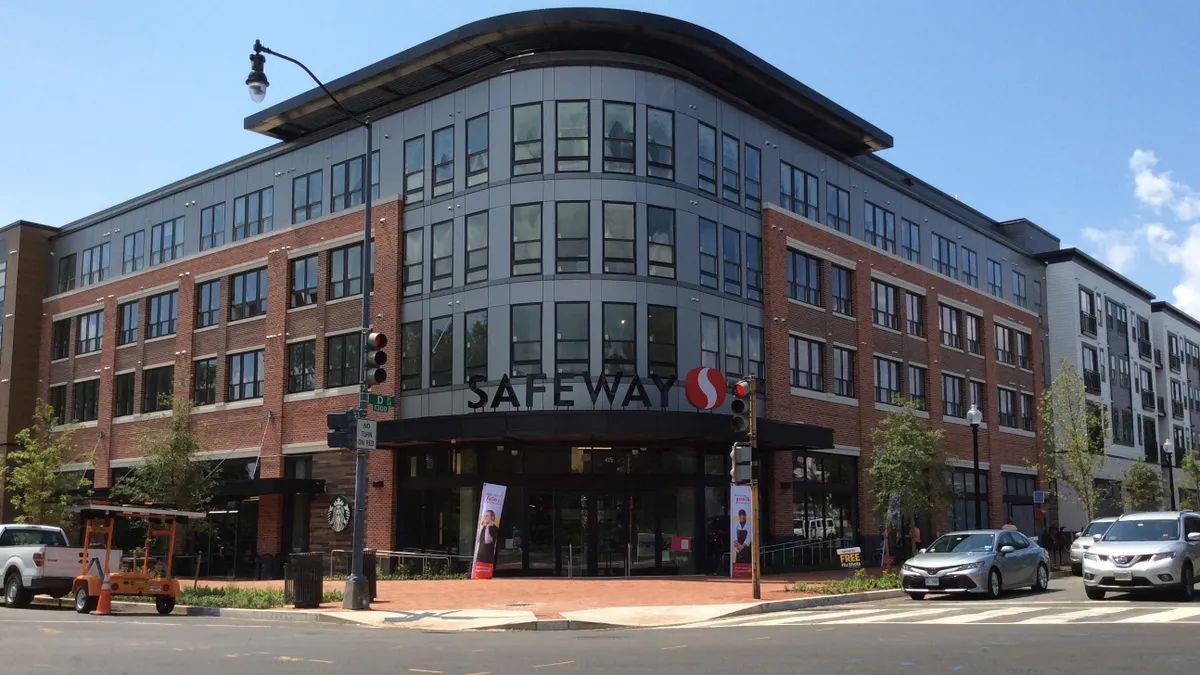Dive Brief:
- Albertsons' store pickup service, Drive Up & Go, grew at a rate of over 1,000% during the fourth quarter of 2020 compared with the same period in 2019 and was up 865% during the year, President and CEO Vivek Sankaran said Monday morning during an earnings call.
- The grocer saw identical sales growth of 11.8% during 2020, but expects that gauge to turn negative in 2021 as the pandemic-driven sales boom it has enjoyed fades. Albertsons projects that same-store sales will decline between 6% and 7.5% this year on a year-over-year basis, but increase 9.4% to 10.9% compared with 2019.
- Albertsons is seeing continued benefits from its investments in automated micro-fulfillment centers (MFCs) as it looks to improve the financial performance of its e-commerce business.
Dive Insight:
Even as Albertsons confronts the reality that the heightened consumer interest in grocery shopping it has seen since the start of the pandemic is subsiding, the company is focusing on improvements to its e-commerce operations that Sankaran said could help turn digital into a moneymaker.
Sankaran pointed to the retailer's strong pickup sales as an example of how it is improving the profitability of its online channels. Margins for Drive Up & Go are improving because higher volumes allow labor costs to be spread out over a greater number of orders, Sankaran said.
"As you see the orders per store going up, you can literally see the labor cost curve … come down pretty rapidly," Sankaran said. "We're starting to get to that in many of our stores."
Albertsons is also seeing returns from its investments in new picking algorithms and software, which have driven down costs by making it easier for workers to collect items for orders, according to Sankaran. In addition, improved in-stock levels have increased the efficiency of Albertson's MFCs by reducing the number of times workers have to look for items on store shelves because they are unavailable in the automated system, he said.
The grocer is opening its third MFC this week and plans to add six more in 2021. Albertsons expects to be running nine MFCs by the end of the year.
"We're adding all these up and starting to feel really good that [Drive Up & Go] can be a profitable engine within the e-commerce offerings that we have," Sankaran said.
Drive Up & Go is now available in 1,420 of the company's stores following the addition of 343 new locations in Q4. Albertsons expects to offer the service at about 2,000 of its more than 2,200 stores by the end of 2021, above its prior goal of 1,800 locations.
Sankaran also said Albertsons has been focusing on improving the financial performance of its delivery business, which he confirmed is not profitable. In recent months the company has shifted delivery to third-party companies in places like Texas and California.
"We just have shifted a lot more of that where we are using third parties [for delivery], and so we are on a path to improve that side of the business, but that will be the harder one to get right on profitability over time," Sankaran said.
Albertsons is placing heavy emphasis on getting orders to delivery customers faster as it strives to improve that segment of its business. "We have prioritized speed. We believe time is money, that people are going to expect shorter and shorter delivery windows, and we have absolutely prioritized that. And that fits with what we're doing with stores and MFCs … and we'll stay on that path for a long time," said Sankaran.
During the call, Sankaran also said Albertsons' private label penetration improved in Q4 and now exceeds 25%. The company generates gross margins on sales of its own brands that are about 10% higher than the margins it gets from selling products under national brands, and expects private label penetration to hit 30% "in the next few years," he said.
Sankaran added that Albertsons is seeing continued strong sales across a number of product categories that have performed exceptionally well during the pandemic. These categories include meat, seafood, produce, eggs, cereals and high-end wines, Sankaran said. Meanwhile, sales of items like soup, pasta and pasta sauce have declined.
Sankaran also said Albertsons is focusing on boosting productivity in 2021 to help it counter uncertainty about what its sales will look like as the year unfolds.
"The further out you go, the harder it becomes to predict what the top line is going to be, which is why we've said we want to have strong productivity programs yielding in the second half of the year. So if the sales turn out to be better than we have imagined, it'll be a strong second half in multiple dimensions, but we've made sure that we have that cushion of productivity in the second half of the year," he said.













